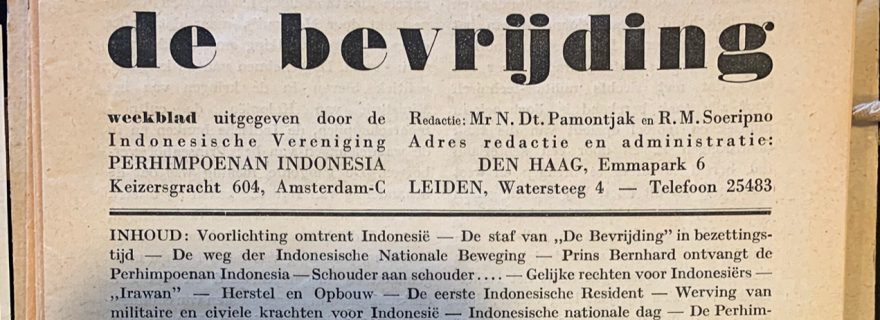A new puzzle piece in the life of Irawan Soejono
At the beginning of the Second World War, a lot of Indonesian students attended university in the Netherlands. One of the best-known Indonesian students is Irawan Soejono. Struck by his story, we discovered new information about his whereabouts and activities during his time as a resistance fighter.
As part of the exhibition Keuzes in oorlogstijd (Choices during wartime), we researched the choices students and professors faced at Leiden University during the Second World War. The story of Irawan Soejono and the Indonesian student resistance was one of the stories we were intrigued by. Many Indonesian students were members of the Indonesian association Perhimpoenan Indonesia (PI) or Roekoen Peladjar Indonesia (Roepi), both of which were pleading for the independence of Indonesia. The slogan of the PI was: ‘Indonesia merdeka!’, which means ‘Free Indonesia’. The rise of Nazism and the occupation of the Netherlands made the independence of Indonesia impossible. That is why the PI and the Roepi joined the underground resistance. After the paper Feiten (Facts) stopped publishing following a razzia, the PI started printing De Bevrijding (The Liberation), to promote resistance against the occupier among Indonesians as well as the Dutch.
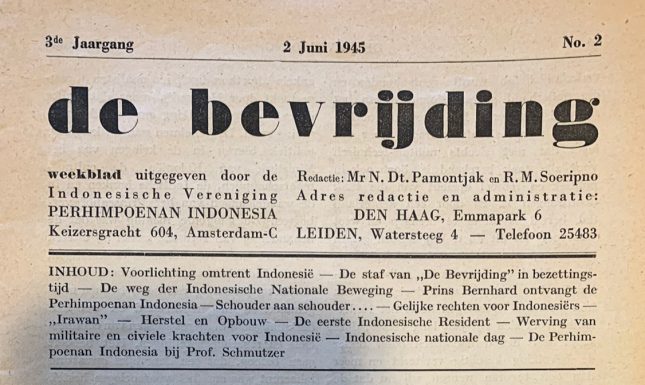
Irawan Soejono was one of the members of the PI. After living in the Hague for two years because of his father's occupation, he returned from Indonesia to the Netherlands with his family on 8 December 1934. He enrolled at Leiden University in 1940 after his parents had moved back to Indonesia. His enrolment didn’t last long. As a reaction to the German order that forced all Dutch universities to fire their Jewish staff, Leiden and TU Delft students organised strikes, in which the Indonesian students took an active part. In the end, the strikes would cause the closing of Leiden University. Like many others, Irawan decided to enrol in Amsterdam, where he studied sociography.
During his time in Amsterdam, Irawan and a fellow Indonesian, Slamet Faiman, helped Jewish children to go into hiding. Irawan was also a member of the first section of the Binnenlandse Strijdkrachten (Interior Forces). Ten Indonesian students were members of this section, also known as the student section. At the time, the group had named themselves after the Indonesian freedom fighter Soerapati.
Besides this, Irawan was also responsible for the distribution of machines, paper, and radios for the printing of De Bevrijding. Thanks to his passion, he received the nickname ‘Henk van de Bevrijding’ or ‘Henk from the resistance’. He did almost everything on his bicycle, with a wheelbarrow in tow or carrying suitcases. In this way, he was able to escape two razzias on separate occasions. On the 13th of January 1945, only two and a half months before the prospective liberation of the Netherlands, Irawan was cycling on the Breestraat with a recently repaired mimeograph. What he didn’t know was that a razzia had started on the Breestraat. Irawan tried to escape through a side street but got shot by a Wehrmacht soldier and died. His untimely death made the troops of the Soeripati change their name to ‘Irawan’.
Partially because of the importance of staying under the radar due to his resistance activities, there are still a lot of question marks around Irawan Soejono’s life. During our search for another important and intriguing document, namely the loyalty declaration, we dug up some new information about him in the Leiden Special Collections. With this loyalty declaration, students at Dutch universities declared that they wouldn’t take part in any form of resistance against the occupier. Rejecting it meant expulsion from any study activities and forced labour in Germany. Our two research subjects crossed paths in the archives of the student cleansings that happened at Leiden University after the war.
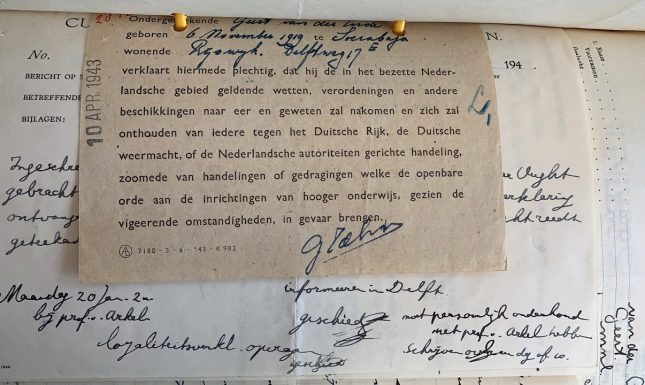

After reading through many folders, we came across the files of student G. van der Ende. Browsing through his files we found a loyalty declaration signed by him: a unique find in itself! Hoping that we could uncover the reasons behind his decision to sign the declaration, we dug deeper into his files. This is how we found a questionnaire that every student had to fill out so the purification committee could evaluate their behaviour during the occupation. Van der Ende’s response to the last question: ‘Which information about your behaviour and health do you consider notable in your evaluation’ had us already excited about what we had found.
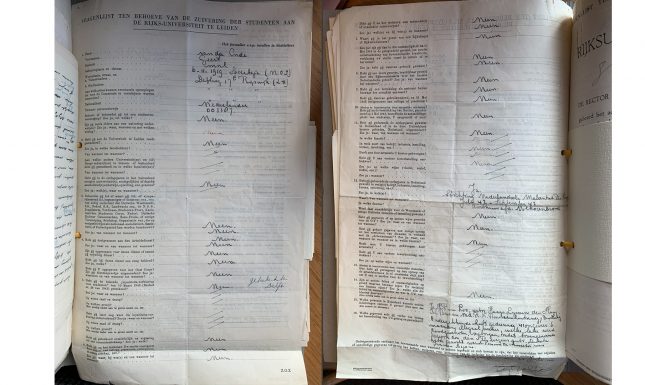

Van der Ende responded: ‘Undersigned hid an illegal worker during [19]41 for 6 months, who was later shot down because the person mentioned above was chased by the SD [Sicherheitsdienst] for anti-German activity. The person in question was Irawan Soejono.’ First, we did not even realize what we had found. But after we reread the answer several times, we were quite excited about our discovery. It was an extraordinary feeling: the two interesting findings coming together in the files of G. van der Ende. From his reply, it appeared that Irawan was already in the crosshairs of the occupier for his underground activities and was thus targeted much earlier than so far thought. Additionally, it gave us more information about his housing situation during the war.
On the 27th of January 2020, Irawan Soejono was commemorated by children and grandchildren of Indonesian resistance fighters during a small ceremony at the place where he has shot dead 75 years earlier. United in ‘Merapi’ their aim is to keep the stories and memory of their ancestors alive. But there is still much research to do into the story of Irawan Soejono and his fellow Indonesian resistance fighters and we would encourage students and researchers alike to make sure the history of these brave students is told and not forgotten. We are genuinely curious as to what is still waiting to be discovered in the Leiden Special Collections.
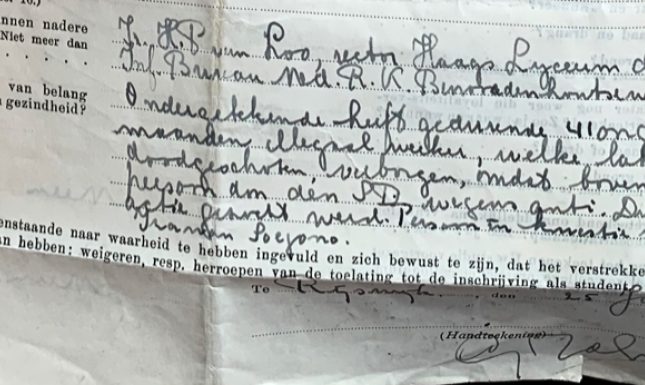

Further reading:
‘Remembering Leiden-Indonesian resistance fighter Irawan Soejono’
About the authors: Ilse La Brijn studies Public History at the University of Amsterdam and Márton Biró is a Dutch Studies major at Leiden University. Both were research assistants at Leiden University Libraries during the preparation of the online exhibition Keuzes in oorlogstijd (Choices during wartime).


